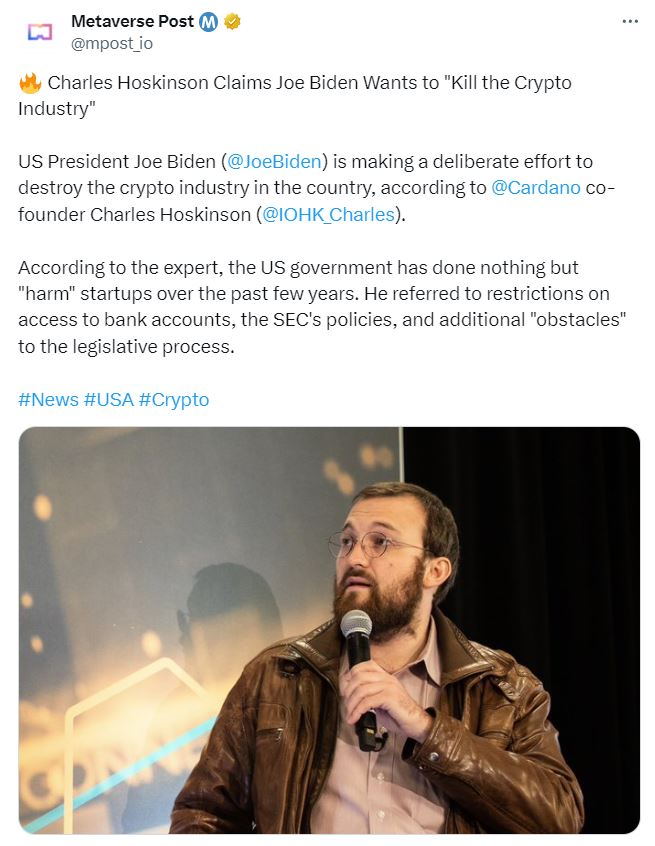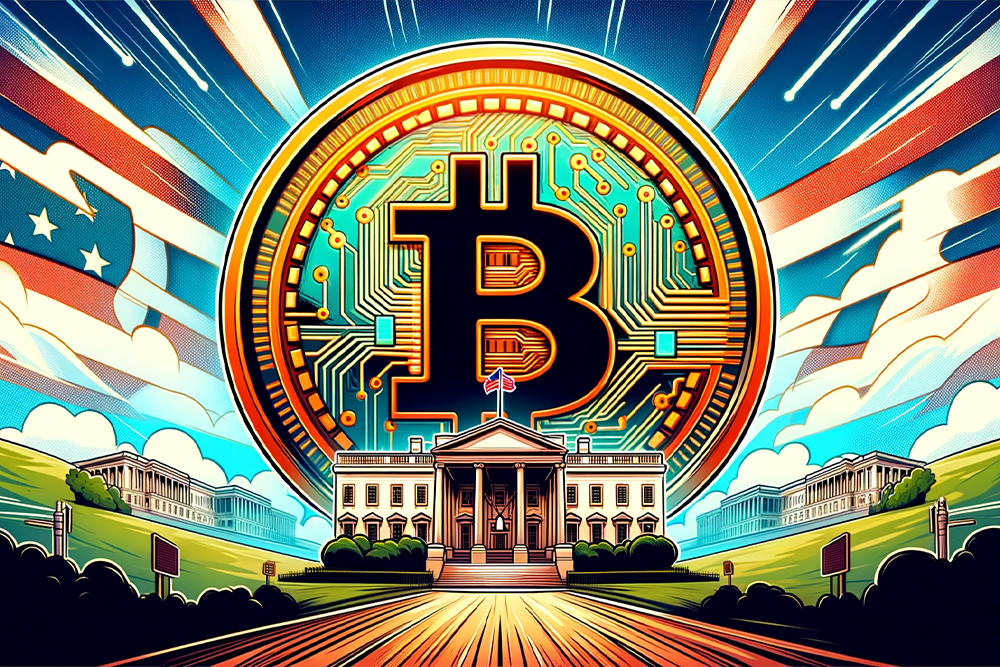Charles Hoskinson, a prominent figure in the cryptocurrency world and founder of the blockchain platform Cardano, has voiced strong criticism of President Joe Biden’s approach to cryptocurrency regulation. Hoskinson, who was also part of the founding team of Ethereum, left to create Cardano, a blockchain that emphasizes social change by providing beneficial use cases to society.
Charles Hoskinson and the Controversy Over SEC’s SAB 121
In a recent broadcast on the social media platform X, dated May 9, Hoskinson discussed the Biden administration’s policies towards the cryptocurrency industry, accusing it of attempting to undermine the sector in the United States. He argued that supporting Biden could be seen as opposing the cryptocurrency industry, particularly in light of a veto by Biden on a resolution that was meant to ease certain restrictions on banks dealing with cryptocurrencies.
This veto concerned the Securities and Exchange Commission’s (SEC) Staff Accounting Bulletin No. 121 (SAB 121), which mandates that financial institutions managing digital assets for customers must record these assets as liabilities on their balance sheets. This policy, initiated under SEC Chair Gary Gensler’s supervision, aims to adjust the industry’s regulatory framework by increasing the capital requirements for banks and custodians, thus placing a significant strain on their capital ratios and escalating administrative costs.
The Biden administration defended the veto, asserting that SAB 121 addresses various risks associated with digital assets that have led to considerable consumer losses. It argues that the policy is necessary for the SEC to protect investors and maintain financial stability. On the contrary, critics like Ji Kim, chief legal and policy officer at the advocacy group Crypto Council for Innovation, argue that the SEC is bypassing standard regulatory procedures by issuing such guidance, which undermines trust and expected diligence in regulatory practices.
Republican Congressperson Mike Flood attempted to counter this with Resolution H.J. Res 109, which successfully passed the House of Representatives. Despite this legislative victory, the White House promptly announced that the resolution would be vetoed by Biden if it reached his desk, asserting that it would impede the SEC’s ability to safeguard investors and the financial system.

Global Perspectives and Future Implications
Amid these developments, Hoskinson criticized the SEC for using outdated regulations to justify its stance, noting that applying rules from the 1933 Securities Exchange Act to assets developed nearly 90 years later is illogical. He contrasted the U.S. regulatory environment with those of countries like Singapore and Switzerland, which have adopted more crypto-friendly policies that have attracted substantial investment and boosted their economies.
Furthermore, Hoskinson pointed out that if the U.S. had a more reasonable regulatory framework, many crypto companies that operate overseas could have been based in the U.S. He also referenced the previous administration under Donald Trump, which, despite its shortcomings, largely overlooked the cryptocurrency sector, unlike the Biden administration which he believes is trying to stifle it.
Former President Trump, speaking on a popular television channel, recently highlighted the potential of cryptocurrencies to drive global economic growth, enhance transparency, and open new investment avenues. He emphasized the importance of not ignoring the technological revolution presented by cryptocurrencies.
Election Implications and Investor Sentiments
As the November election draws closer, the debate over cryptocurrency regulation is gaining prominence, potentially influencing voter behavior. The industry’s stance on regulatory policies and the broader implications for innovation and economic growth are becoming key issues. The differing perspectives of Biden and Trump illustrate a complex landscape that voters and investors must navigate as they consider the future of cryptocurrencies in the U.S.
The reactions to these political stances are mixed, with some investors feeling reassured by Trump’s more open approach, while others remain cautious due to the regulatory uncertainties highlighted by Hoskinson. The evolving positions of the presidential candidates on this issue will undoubtedly be closely watched by those within and outside the cryptocurrency sector.
- Crypto Price Update July 24: BTC Maintains $66K, ETH at $3.4K, XRP, TON, and ADA Rallies
- Bitcoin Falls to $65K as Mt. Gox Transfers $2.8 Billion BTC to External Wallet
- News of Marathon Digital’s $138 Million Fine for Breach of Non-Disclosure Agreement Triggers a Bearish 2.5% of Its MARA Stock
- Are $530M Bitcoin ETF Inflows a Blessing or Caution?
- Metaplanet Teams with Hoseki for Real-Time Bitcoin Holdings Verification
- Building Secure Blockchain Systems: An Exclusive Interview with ARPA and Bella Protocol CEO Felix Xu
- Building The “De-Facto Crypto Trading Terminal”: An Exclusive Interview with Aurox CEO Giorgi Khazaradze
- Building a New Global Financial System: An Exclusive Interview With Tyler Wallace, Analytics Head at TrustToken
- “Solana is the Promised Land for Blockchain” — An Exclusive Interview with Solend Founder Rooter
- El Salvador: Where The Bitcoin Revolution Begins With A Legal Tender

 Why Trust Us
Why Trust Us







